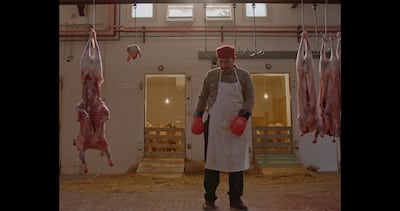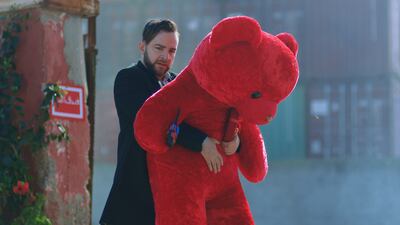Netflix’s newest Arabic original Love, Life and Everything in Between is an anthology of eight short films set around Valentine’s Day.
Directed by some of the most celebrated filmmakers from the Arab world, the works shatter any rose-tinted preconceptions of what stories revolving around a holiday of heart-shaped chocolates and sweet-nothings will be about.
There’s romance and tenderness, sure, but also deceit, desperation and shades of Kafkaesque encounters that entwine the eerie with the comical.
“We wanted to do something different and original when we were dealing with the coronavirus pandemic,” producer Antoine Khalife tells The National. “The idea was to do something with several Arab filmmakers.”
Khalife says the anthology was conceived by Egyptian scriptwriter Azza Shalaby with the aim of exploring love and relationships in stories from different Arab countries, namely Egypt, Lebanon, Palestine, Saudi Arabia, Morocco and Tunisia.
“We liked the idea of black comedy mixed with absurdity, mixed with symbolism,” he says. “We thought to ourselves if we were going to go this way, we needed to work with some creative filmmakers.”
The anthology, which released on Netflix on Thursday, brings together works by directors from across the region, including Egypt's Khairy Beshara and Sandra Bassal, Michel Kammoun from Lebanon, Moroccan director Hicham Lasri, Palestine's Hany Abu Assad and Amira Diab, Saudi filmmakers Mahmoud Sabbagh and Abdulmohsen Al Dhabbaan, as well as Tunisian director Kaouther Ben Hania.

Much like her 2020's Oscar-nominated The Man Who Sold His Skin, Ben Hania’s film in the anthology Baby Doll and Lamb Chops is propelled by financial desperation.
She says she immediately knew she wanted her short film to verge on the absurd when she was approached for the project, but also wanted to touch upon the contemporary economic realities of Tunisia.
“I was already thinking about the economic difficulty of the normal Tunisian citizen,” she says. “And when Antoine told me the project was about love, we thought it could be hilarious, since it’s a dark comedy, if I link the two things together.”
Ben Hania says she also sought to strip away notions of love as being “fresh and romantic”.
“Many people can’t live their love story,” she says.
director
Baby Doll and Lamb Chops tells the story of a butcher who struggles to get paid from the government financial administrator, putting him in between a disgruntled staff member and the self-wrought expectation of buying his girlfriend a present on Valentine’s Day.
“The film started somewhere from thinking about someone struggling to get paid,” Ben Hania says. “He’s putting pressure on himself to buy a good, beautiful gift and go out to dinner with his girlfriend.”
Along the way, the butcher comes across a menagerie of unexpected characters, who are all trying to do their best to overcome their financial hurdles and mark the holiday.
“I love side characters,” Ben Hania says. “They are not a separate entity, but they are there to serve something, you know, to make the hero’s life hell. I find this very amusing when I’m writing. Not that I’m sadistic or something, but it’s interesting to work with such characters.”
“Side characters bring a weirdness, a poetic element, something even divine into the story,” says Lasri, who directed the final film in the collection Sidi Valentine.
“They also bring irony. For me, it’s always about irony when we talk about love, celebrating love and not understanding or tolerating love, it is about irony,” he says.

Sidi Valentine begins with a chance encounter in front of a chocolate shop. "Love at first sight" tropes are soon upended as the protagonist discovers his car has been towed with his niece asleep in the back seat. He then urges the woman he just met to help him locate the car. Hilarity and even terror ensue.
“What is terrible about love is that when it starts, there is this clock ticking somewhere. It will end somehow, someway,” says Lasri, whose previous short films include Cruelty Free and Love in Aleppo.
The Moroccan director says he wanted the film to focus on “the fragility” of who we project ourselves to be. “We are afraid of perceptions. We are afraid of what people might think about us.”
The film, he says, is a kind of “dance to death and love” as much as it is an examination of societal notions of love in Casablanca.
“People aren’t comfortable talking about love,” he says. “Thy can say they love their mothers or daughters, but are a bit shy when talking about it from a romantic perspective. Love is a step towards happiness, and it became a little bit awkward because people are afraid to express their love.”


